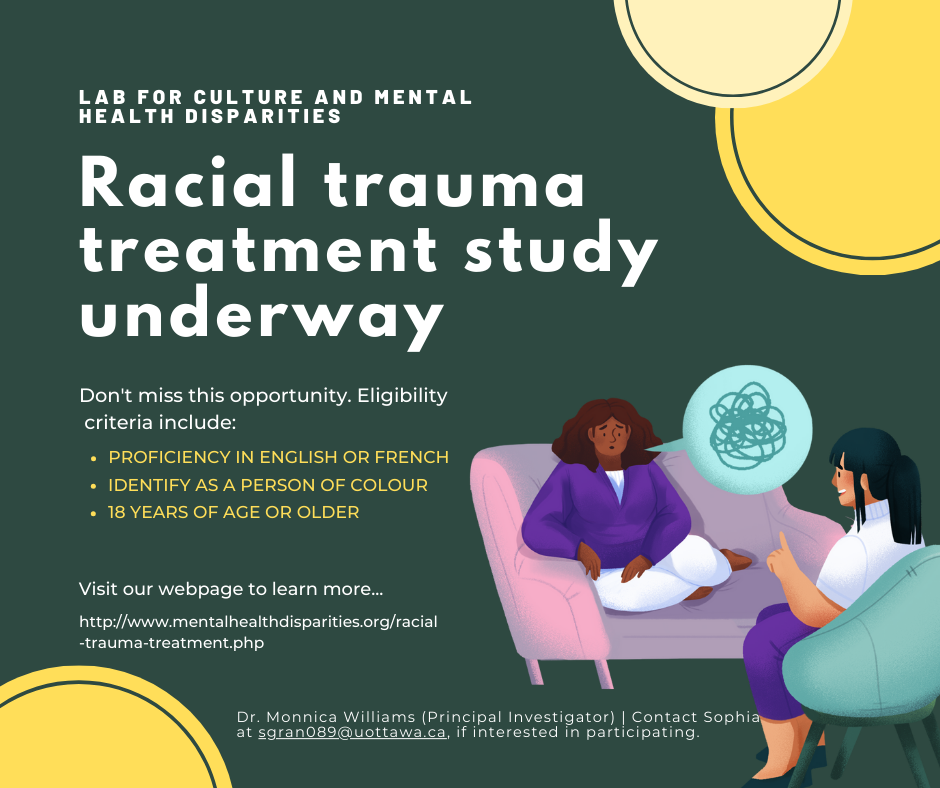Discrimination
Discrimination can Cause Stress and Unwellness
There are many different ways people can experience discrimination. Some examples include:
- Racism
- Sexism
- Sexual Harrasment
- Sexual Orientation
- Age Discrimination (Ageism)
- Body size discrimination
- Religious Discrimination
- Islamophobia
- Pregnancy Discrimination
- Xenophobia


About Racial Trauma
One form of discrimination called racism, can result in racial trauma. At BWC one of our specialities is the treatment of racial trauma.
People of colour are consistently exposed to the many types of racism cumulatively which can lead to traumatization. Increased traumatization in people of colour due to cumulative effects of racism may account for the higher rates of post traumatic stress disorder (PTSD), and can also be referred to as racial trauma or race-based traumatic stress. It is typified by reactions to vicarious or direct exposure to events which include real or perceived threats, experiences of shame and humiliation or racial discrimination directed at people of colour. Anxiety, suicidal ideation, depression, despair, and poor physical health are typical features of racial trauma.
Racially traumatic events will evoke emotions associated with the event such as shock, fear, or anger, and if these experiences are invalidated by others, symptoms can worsen to those of PTSD including intrusive thoughts, avoidance, hypervigilance, and negative changes in mood and cognitions.
If a culturally-informed professional help is inaccessible due to institutional racism and barriers to proper treatment, the PTSD may worsen and become disabling. Professionals may lack awareness or training on racism-based treatment protocols, or they may hold their own biases which can cause discomfort when addressing the topic of race, leaving the client’s racial trauma improperly addressed and treated. Here at BWC all of our therapists are trained in culturally competent treatment protocols, and able to correctly identify and treat racial trauma.
Defining Racism

To understand the mental health impacts of racism, we must define racism and then identify how it manifests as a whole and within Canadian society specifically. Racism is a system of beliefs (prejudices), practices (discrimination), and policies based on individuals’ presumed race. It has historically been enacted in powerful Western societies in places such as the US and Canada. In these countries, race is a clear division within society based on shared physical features and assumed heritage. However, since racism is so deeply systemic, even an individual of a racialized or Indigenous group may still harbour racism. The culture of racism affects everyone that has been exposed to it from childhood through adulthood, both on the receiving and perpetuating end, leading to the normalisation of harmful racist thought patterns.
As mentioned, racism can take on many different forms. Dominative racism can be described as “old fashioned racism” — beliefs and acts of overt bigotry by means of racial slurs, threats, and acts of brutality. Symbolic racism, otherwise known as modern racism occurs as negative stereotypes toward people of colour such as ideology that POC are aggressive, lazy, criminals, etc. Aversive racism, or is when one may claim support for racial equality and justice, yet still hold implicit negative attitudes toward people of colour and may act racist. Internalised racism happens when people of colour attribute Whiteness to having value and hold negative views of other people of colour. They may adopt characteristics associated with being White, distance themselves from their racial group, and often prefer to socialise with White people.
Everyday racism refers to covert, unrecognisable acts that may go dismissed or unnoticed in one’s daily life through cognitive and behavioural practices that reinforce power dynamics. A form of everyday racism are microaggressions – discrete, subtle and insidious actions, statements or insults committed toward people of colour, either intentionally or unintentionally. These often tend to be subtle, sometimes ambiguous or deniable acts that have a strong collective impact, and are also associated with negative mental health outcomes.
Last but not least, structural racism refers to the system of institutional and public policies and practices instilled to maintain racial inequities and disadvantage people of colour. Social systems have been inherently structured to limit the success of people of colour and their access to social, educational, economic, and political opportunities. Thus, racism is significantly more complex than heinous acts of prejudice and violence seen in the media that have been committed by White individuals against people of colour. It operates within organised structures and societies where people of colour live and aspire for their goals, in the form of barriers and inequities which are typically unacknowledged.
Racial Trauma in the Media
Dr. Monnica Williams is a leading voice for stress due to discrimination and mental health disparities internationally.
- Rogers, K. (2023, February 16). Understanding racial trauma, the mental and emotional injury of racism. CNN.
- Duffy, A. (2022, March 24). How Ottawa psychologists are trying to treat the trauma of racism. Ottawa Citizen.
- Sharma, A. (2021, November 29). For BIPOC employees, remote work meant a welcome break from office microaggressions. CBC News.
Research Addressing Discrimination
Resources for Clinicians
Williams, M., Bartlett, A., Zare, M., Custer, N. & Osman, M. (in press). Sexual harassment and abuse in law enforcement: Best practices for creating safety for female officers. The Police Journal: Theory, Practice and Principles.
Williams, M. T., Holmes, S., Zare, M. Haeny, A. H., & Faber, S. C. (in press). An evidence-based approach for treating stress and trauma due to racism. Cognitive and Behavioral Practice.
Williams, M., Faber, S. C., & Duniya, C. (2022). Being an anti-racist clinician. The Cognitive Behaviour Therapist, 15(e19), 1-22. [invited]
Ching, T. H. W., Lee, S., Chen, J., So, R., & Williams, M. T. (2018). A model of intersectional stress and trauma in Asian American sexual and gender minorities. Psychology of Violence, 8(6), 657-668.